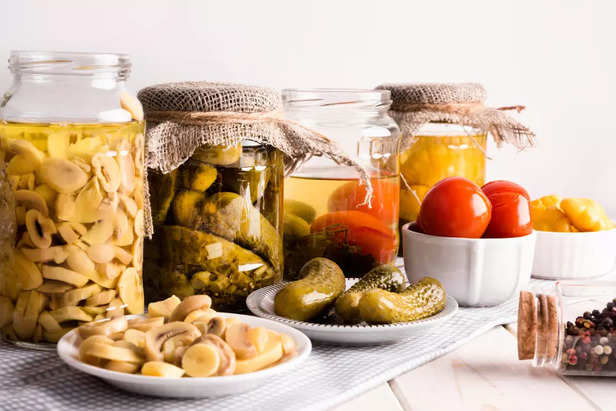Struggling With Mood Swings? Your Diet Might Be To Blame
Shumaila Siddiqui | Tue, 25 Mar 2025
Gut health plays a vital role in regulating mood, emotions, and overall mental well-being. The right foods can enhance serotonin production, reduce stress, and improve cognitive function. An unhealthy diet disrupts gut balance, leading to mood swings and mental fatigue. Making mindful food choices supports both digestion and emotional stability.

Photo:
A healthy outside starts from the inside.Have you ever noticed how your mood shifts after eating certain foods? A warm bowl of soup may feel comforting, while processed snacks might leave you sluggish. That’s because what you eat doesn’t just impact your physical health—it directly affects your mental well-being too. The connection between gut health and mood is a fascinating area of research that highlights how diet can influence emotions, stress levels, and even long-term mental health.
The

The gut and the brain are connected through a complex communication system known as the gut-brain axis. This link allows your digestive system and central nervous system to send signals to each other. Surprisingly, about 90% of serotonin—a neurotransmitter responsible for feelings of happiness and relaxation—is produced in the gut. When your gut health is compromised, serotonin production can be affected, leading to mood swings, anxiety, and even depression.
Furthermore, your gut is home to trillions of bacteria, collectively known as the gut microbiome. These bacteria play a crucial role in digestion, immunity, and mental well-being. When the balance of good and bad bacteria is disrupted (a condition called dysbiosis), it can contribute to inflammation, stress, and poor mental health.
Neurotransmitters are chemicals in the brain that help regulate mood and cognitive functions. Since most serotonin is produced in the gut, a well-balanced microbiome plays a crucial role in stabilizing emotions. Gut bacteria also produce gamma-aminobutyric acid (GABA), which helps control anxiety, and dopamine, a neurotransmitter linked to pleasure and motivation. A poor diet disrupts this balance, leading to irritability, low energy, and mental fog.
If you want to nurture both your gut and your mind, incorporating the right foods into your diet is essential. Here are some gut-friendly foods that can positively impact your mood:
1. Fermented Foods: The Probiotic Powerhouse

Foods like yogurt, kefir, kimchi, and miso contain probiotics, which are beneficial bacteria that support gut health. Studies suggest that probiotics can help reduce symptoms of anxiety and depression by improving gut flora.
2. Prebiotic Foods: Fuel for Good Bacteria
Prebiotics are fibers that feed the good bacteria in your gut. Foods like garlic, onions, bananas, and asparagus are excellent sources of prebiotics that support digestion and emotional balance.
3. Leafy Greens: A Natural Stress Buster
Vegetables like spinach, kale, and Swiss chard are rich in fiber, vitamins, and minerals. They help regulate digestion and provide essential nutrients for brain function.
4. Omega-3 Fatty Acids: Mood-Boosting Fats
Found in fatty fish (salmon, mackerel, sardines), flaxseeds, and walnuts, omega-3s have anti-inflammatory properties that support brain health and reduce symptoms of depression.
5. Whole Grains: Slow-Release Energy for the Brain
Brown rice, quinoa, and oats provide complex carbohydrates that help stabilize blood sugar levels, preventing mood crashes and fatigue.
6. Dark Chocolate: A Treat for the Gut and Brain

High-quality dark chocolate (at least 70% cocoa) contains antioxidants and prebiotics that support gut bacteria while boosting serotonin levels, promoting feelings of happiness.
7. Nuts and Seeds: Nutrient Powerhouses
Almonds, cashews, sunflower seeds, and chia seeds are rich in fiber, healthy fats, and magnesium, which help reduce stress and anxiety while promoting a balanced gut microbiome.
8. Herbs and Spices: Natural Mood Enhancers

Turmeric, ginger, and peppermint have anti-inflammatory and gut-soothing properties. Turmeric, in particular, contains curcumin, which has been shown to support brain function and reduce depression symptoms.
The Downside of

While some foods can uplift your mood, others can do just the opposite. Diets high in processed foods, refined sugars, and artificial additives can disrupt gut bacteria, leading to increased inflammation and mental distress. Sugary foods may give you a temporary energy boost, but they cause blood sugar crashes that lead to irritability and fatigue. Limiting fast food, excessive caffeine, and highly processed snacks can help maintain a balanced gut microbiome and stable mood.
How Sugar Affects Mood
Excess sugar consumption triggers a rapid spike in blood sugar levels, followed by a crash, leading to mood swings and fatigue. High sugar intake also promotes the growth of harmful bacteria in the gut, which may contribute to depression and anxiety. Instead of refined sugar, opt for natural sweeteners like honey or fruits.
Processed Foods and Inflammation
Highly processed foods often contain trans fats, artificial preservatives, and low-quality ingredients that trigger gut inflammation. Chronic inflammation has been linked to mental health disorders such as depression and cognitive decline. Choosing whole, natural foods over packaged options helps protect both gut and brain health.

For optimal gut and mental health, you need to include certain key nutrients in your diet. Here are the most essential ones and where you can find them:
1. Fiber
2. Omega-3 Fatty Acids
3. Magnesium
4. Probiotics
5. Tryptophan
6. Antioxidants
7. Vitamin D
Lifestyle Habits That Support a Happy Gut and Mind

Apart from eating the right foods, making small lifestyle changes can further enhance gut health and mental well-being:
Your diet plays a crucial role in shaping your emotions and mental clarity. By incorporating gut-friendly foods, reducing processed junk, and adopting healthy habits, you can create a positive impact on both your digestive health and mood. A balanced gut means a balanced mind—so make mindful eating a priority and enjoy the benefits of a healthier, happier you!
Unlock insightful tips and inspiration on personal growth, productivity, and well-being. Stay motivated and updated with the latest at My Life XP.
The Gut-Brain Connection : More Than Just Digestion

Gut-Brain Connection
The gut and the brain are connected through a complex communication system known as the gut-brain axis. This link allows your digestive system and central nervous system to send signals to each other. Surprisingly, about 90% of serotonin—a neurotransmitter responsible for feelings of happiness and relaxation—is produced in the gut. When your gut health is compromised, serotonin production can be affected, leading to mood swings, anxiety, and even depression.
Furthermore, your gut is home to trillions of bacteria, collectively known as the gut microbiome. These bacteria play a crucial role in digestion, immunity, and mental well-being. When the balance of good and bad bacteria is disrupted (a condition called dysbiosis), it can contribute to inflammation, stress, and poor mental health.
The Role of Neurotransmitters
Foods That Support Gut Health and Mental Well-Being
1. Fermented Foods: The Probiotic Powerhouse

The Probiotic Powerhouse
Foods like yogurt, kefir, kimchi, and miso contain probiotics, which are beneficial bacteria that support gut health. Studies suggest that probiotics can help reduce symptoms of anxiety and depression by improving gut flora.
2. Prebiotic Foods: Fuel for Good Bacteria
Prebiotics are fibers that feed the good bacteria in your gut. Foods like garlic, onions, bananas, and asparagus are excellent sources of prebiotics that support digestion and emotional balance.
3. Leafy Greens: A Natural Stress Buster
Vegetables like spinach, kale, and Swiss chard are rich in fiber, vitamins, and minerals. They help regulate digestion and provide essential nutrients for brain function.
4. Omega-3 Fatty Acids: Mood-Boosting Fats
Found in fatty fish (salmon, mackerel, sardines), flaxseeds, and walnuts, omega-3s have anti-inflammatory properties that support brain health and reduce symptoms of depression.
5. Whole Grains: Slow-Release Energy for the Brain
Brown rice, quinoa, and oats provide complex carbohydrates that help stabilize blood sugar levels, preventing mood crashes and fatigue.
6. Dark Chocolate: A Treat for the Gut and Brain

Treat for Gut and Brain
High-quality dark chocolate (at least 70% cocoa) contains antioxidants and prebiotics that support gut bacteria while boosting serotonin levels, promoting feelings of happiness.
7. Nuts and Seeds: Nutrient Powerhouses
Almonds, cashews, sunflower seeds, and chia seeds are rich in fiber, healthy fats, and magnesium, which help reduce stress and anxiety while promoting a balanced gut microbiome.
8. Herbs and Spices: Natural Mood Enhancers

Natural Mood Enhancers
Turmeric, ginger, and peppermint have anti-inflammatory and gut-soothing properties. Turmeric, in particular, contains curcumin, which has been shown to support brain function and reduce depression symptoms.
The Downside of Processed Foods and Sugar

Downside of Processed Foods
While some foods can uplift your mood, others can do just the opposite. Diets high in processed foods, refined sugars, and artificial additives can disrupt gut bacteria, leading to increased inflammation and mental distress. Sugary foods may give you a temporary energy boost, but they cause blood sugar crashes that lead to irritability and fatigue. Limiting fast food, excessive caffeine, and highly processed snacks can help maintain a balanced gut microbiome and stable mood.
How Sugar Affects Mood
Processed Foods and Inflammation
Vital Nutrients and the Foods That Contain Them

Vital Nutrients
For optimal gut and mental health, you need to include certain key nutrients in your diet. Here are the most essential ones and where you can find them:
1. Fiber
- Supports gut bacteria and regulates digestion
- Found in: Whole grains, legumes, fruits, and vegetables
- Reduces inflammation and supports brain function
- Found in: Fatty fish, flaxseeds, chia seeds, and walnuts
- Helps reduce stress and anxiety
- Found in: Almonds, spinach, avocados, and dark chocolate
- Supports a healthy gut microbiome
- Found in: Yogurt, kimchi, sauerkraut, and kefir
- Precursor to serotonin, the happiness hormone
- Found in: Turkey, eggs, cheese, and pumpkin seeds
- Protects brain cells from damage and aging
- Found in: Berries, green tea, dark chocolate, and nuts
- Enhances mood and immune function
- Found in: Sunlight exposure, fortified dairy, salmon, and mushrooms
Lifestyle Habits That Support a Happy Gut and Mind

Good Lifestyle Habits
Apart from eating the right foods, making small lifestyle changes can further enhance gut health and mental well-being:
- Stay Hydrated: Drinking enough water supports digestion and helps maintain gut balance.
- Practice Mindful Eating: Chewing food slowly and avoiding overeating prevents digestive stress.
- Get Enough Sleep: Poor sleep negatively affects gut health and emotional stability.
- Manage Stress: Activities like yoga, meditation, and deep breathing exercises can support a healthy gut-brain connection.
- Regular Exercise: Physical activity boosts the production of beneficial gut bacteria and releases endorphins, which enhance mood.
Final Thought: A Healthy Gut, A Happier You
Unlock insightful tips and inspiration on personal growth, productivity, and well-being. Stay motivated and updated with the latest at My Life XP.










